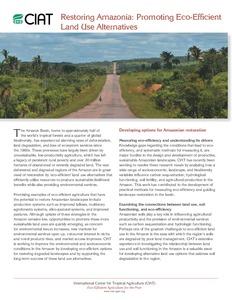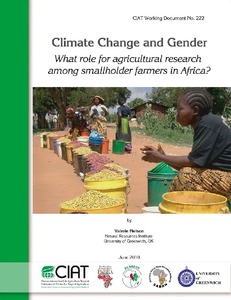Mission
To reduce hunger and poverty, and improve human nutrition in the tropics through research aimed at increasing the eco-efficiency of agriculture.
People
CIAT’s staff includes about 200 scientists. Supported by a wide array of donors, the Center collaborates with hundreds of partners to conduct high-quality research and translate the results into development impact. A Board of Trustees provides oversight of CIAT’s research and financial management.
Values
- Shared organizational ethic
- We respect each other, our partners, and the people who benefit from our work. We act with honesty, integrity, transparency, and environmental responsibility in all of our joint endeavors.
- Learning through partnerships
- We work efficiently and pragmatically together and with partners. Considering our diversity to be a key asset, we adapt readily to change and strive to improve our performance through continuous learning.
- Innovation for impact
- We develop innovative solutions to important challenges in tropical agriculture, resulting in major benefits for the people who support, participate in, and profit from our work.
Members:
Resources
Displaying 336 - 340 of 958Restoring Amazonia: promoting Eco-Efficient land use alternatives = Restauración de la Amazonia: fomento de alternativas Eco-Eficientes para uso del suelo
The Amazon Basin, home to approximately half of the world’s tropical forests and a quarter of global biodiversity, has experienced alarming rates of deforestation, land degradation, and loss of ecosystem services since the 1960s. These processes have largely been driven by unsustainable, low-productivity agriculture, which has left a legacy of persistent rural poverty and over 30 million hectares of abandoned or severely degraded land.
Manejo del suelo en la Altillanura de los Llanos Orientales de Colombia
Soil management in the Altillanura of Colombia’s Eastern Plains The strategies used for adequate soil management for the Altillanura (high plains with flat topography) of Colombia’s Eastern Plains are reviewed to establish modern, efficient, and sustainable livestock systems in this region. Advances in technology development within the technical and scientific cooperation agreement signed between Colombia’s Ministry of Agriculture and Rural Development (MADR) and CIAT, as well as those of the Center’s Soils Project and several national institutions co-partners in the agreement.
Rizipiscicultura: alternativa para la seguridad alimentaria
Rice-fish farming: A food security alternative Rice-fish farming is a biological or clean production system that consists of the simultaneous farming of rice and fish on the same land and at the same time; in other words, in the plots flooded for rice cultivation. Rice is the main product and has greater economic importance, whereas the fish is both a source of additional income and a protein supplement that improves the nutritional quality of farmers’ diets.
Creating ecoefficient landscapes in deforested Amazonia: lessons from the AMAZ project
Climate change and gender: what role for agricultural research among smallholder farmers in Africa?
This study was commissioned to provide an understanding of the complex impacts climate change will likely have on existing gender and social inequalities.




